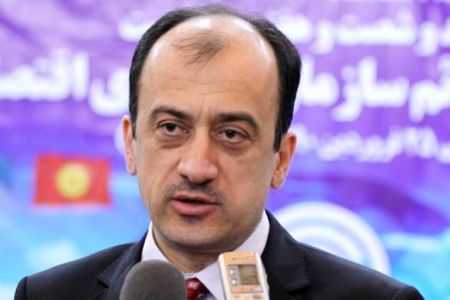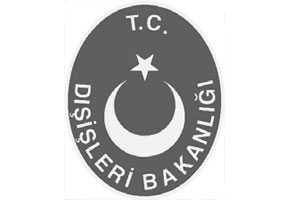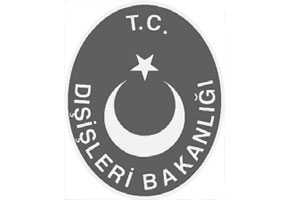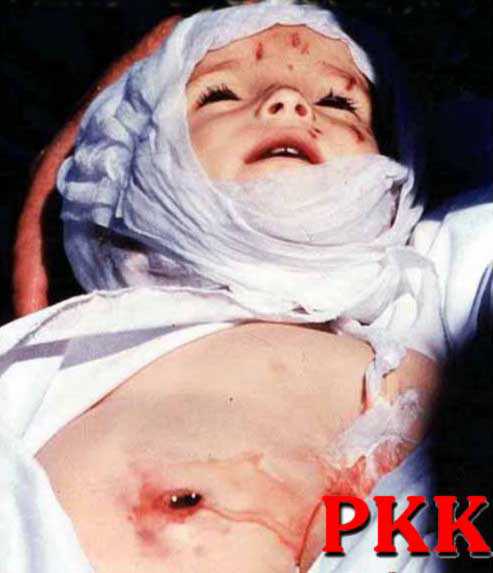The reluctance of many European countries to move against terrorist Kurdistan Workers’ Party (PKK) activities on their soil continues to be a major concern for the Turkish government, which has been increasingly vocal in its demand for quick action to curb financial and logistical support to the outlawed organization.
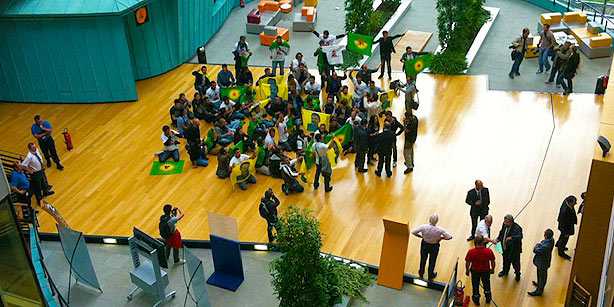
A group of about 60 supporters of the terrorist PKK were able to get past security and gain entry to the Council of Europe in Strasbourg on Sept. 13, 2011. (Photo: Cihan)
The PKK continues to operate in such countries as Germany, Austria, Belgium, the Netherlands, Norway, Sweden, Finland, the UK, France and Italy. Though the PKK has been experiencing hard times recently due to operations launched against the terrorist organization in some European countries, it continue to raise funds and find new recruits in others without any major difficulty, analysts say.
The arrest and then conditional release of several PKK leaders in Belgium, the ongoing judicial process against the PKK in France and the ongoing case into the PKK-affiliated ROJ TV in Denmark are signs that the PKK may confront some difficulty in some European countries. Yet in others, especially in Germany, the PKK operates freely, runs public campaigns, courts politicians and collects money for terror attacks against Turkish military, police and civilian targets in Turkey.
The latest criticism on the issue came from Parliament Speaker Cemil Çiçek, who lashed out at German authorities for turning a blind eye to PKK terror activities in Germany. Çiçek deliberately chose the venue to deliver his message when he was travelling on a symbolic train ride from İstanbul to Germany to commemorate the 50th anniversary of the emigration of Turkish workers to the European country.
He said, “The number of outlawed PKK and Revolutionary People’s Liberation Party/Front [DHKP/C] members in Germany is twice that in Kandil [a mountain range in Iraq where the PKK’s headquarters are located].”
Despite being listed as a terrorist organization in Germany, the PKK continues to operate under various names in the EU’s largest member country. The PKK has been listed as a terrorist organization by Germany since 1993; however, it continues to be active in the country under various names. Turkey has especially criticized Germany many times in recent years for not properly dealing with the PKK and other terrorist organizations active in Turkey and for not returning members of those organizations living in Germany, where it is estimated that around 4 million Turks live.
Last month Turkish Prime Minister Recep Tayyip Erdoğan also accused a number of German funds of funneling money to the PKK through loans offered to municipalities run by the pro-Kurdish Peace and Democracy Party (BDP), the political wing of the PKK.
Süleyman Özeren, an associate professor at the Turkish National Police Academy, which specializes in security and terrorism, told Today’s Zaman that Germany stands out among other European countries as the most reluctant partner in combating the PKK. “Germany has become the most important country for the PKK not only in raising hundreds of millions of euros for the terror organization but also recruiting young militants to the PKK,” he said. Özeren underlined that Germany is the least willing to lend support to Turkish efforts in fighting PKK terror.
“We do not see the German government taking effective measures to make it difficult for the terror organization to raise money or recruit new militants. The country has turned out to be the best place for the PKK to run terror propaganda openly and without any difficulty,” Özeren explained. He warned that it this continues unabated, both Germany and other European countries will pay a heavy price for harboring terror organization in their midst.”
At the 2011 Bosporus Conference in İstanbul two weeks ago, Turkey’s EU Minister and chief negotiator Egemen Bağış also urged Europe to take more concrete steps against PKK terror. He asked European countries to work together with Turkey to combat terrorism, adding, “What al-Qaeda is to the West, the PKK is to Turkey.”
“The PKK is not only an enemy of Turkey, but also of Europe because while the PKK kills Turkish people with bullets, it is killing European youth with drugs,” Bagış said.
Strategic Research and Study Center (SAREM) head Önder Aytaç argues that European countries have a vested interest in seeing Turkey involved in internal problems so that it will be in a weak position. “As long as the PKK does not pose a threat to the vital interests of European countries, they will continue to turn a blind eye to PKK activities in their territories,” he said, adding that the European security agencies will not interfere with PKK activities at this stage. “They [PKK militants] do not engage in terror activities in host countries in Europe in order to not invite the wrath of the security services there,” Aytaç told Today’s Zaman.
In fact, the EU’s police agency, Europol, in its latest report confirmed the PKK’s involvement in activities such as drug smuggling, human trafficking and money laundering. “Information obtained from EU member states shows, for instance, that both the PKK/Kongra-Gel are actively involved in drugs and human trafficking, the facilitation of illegal immigration, credit card skimming, money laundering and fraud for the purpose of funding terrorist [support] operations,” Europol said in its 2011 EU Terrorism Situation and Trend Report (TE-SAT).
The report also said the PKK was pursuing a “double strategy” of resorting to violence in Turkey, while seeking legitimacy abroad and likely to pursue this double strategy. It also noted that the terrorism threat posed by the group to EU states can currently be considered as “relatively low.” “However, the large number of PKK/Kongra-Gel militants living in the EU and the continuing support activities in the EU, like large demonstrations organized in the past, show that the PKK/Kongra-Gel is in a position to mobilize its constituency at any time and is an indication that it maintains the capability to execute attacks in the EU,” it added.
The 2011 report of the Federal Office for the Defense of the Constitution (Bundesverfassungsschutz) also confirmed Europol findings, saying that the PKK collects funds from Kurds in Germany and even sends people to join its militia arm, the People’s Defense Forces (HPG), who fight against the Turkish army and in the mountainous regions of northern Iraq. The report states that the PKK has 11,500 members in Germany. The report further indicates “a few million euros” have been collected by the organization. It also states that some Kurdish youths join the PKK; however, no exact figure is given on the number of people who have joined the terrorist organization.
Another report by the Federal Office for the Protection of the Constitution in Austria, unveiled by Austrian Interior Minister Johanna Mikl-Leitner in early August, also confirms German findings. The report said the main goal of PKK activities in Europe is to finance the administrative units of the terrorist organization and win new members to the ranks of the PKK. The report drew attention to the contradictory attitudes of the PKK in Europe as the terrorist organization seems to adopt a pro-peace attitude on one side, while it still perpetuates its armed struggle. The reports say the PKK’s messages about adhering to democracy and abandoning violence and separatist ideas are not realistic.

